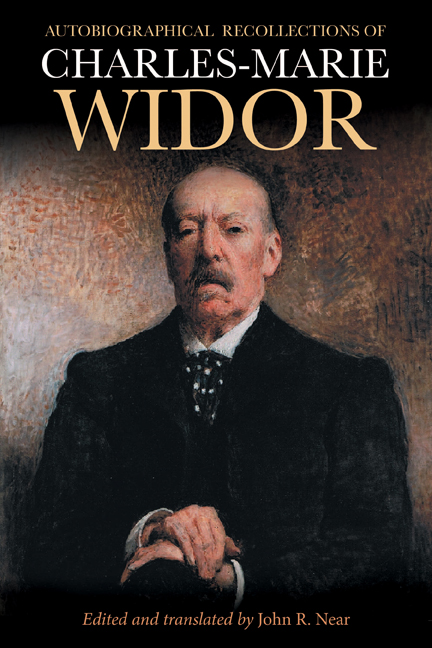Book contents
- Frontmatter
- Contents
- List of Illustrations
- Foreword
- Preface
- Acknowledgments
- Introduction: Tribute to Charles-Marie Widor
- Part One Studies, Early Performances, and Aristide Cavaillé-Coll (1844–69)
- Part Two La Belle Époque: The Franco-Prussian War to The Great War (1870–1914)
- Part Three The Great War and Important Initiatives (1914–37)
- Appendix 1 Birth record of Charles-Marie Widor, 1844
- Appendix 2 Widor’s Diplôme de Bachelier ès Lettres, 1863
- Appendix 3 Widor’s letter of appreciation to Jacques Lemmens, 1863
- Appendix 4 Brussels Ducal Palace organ specification, 1861
- Appendix 5 Widor’s certificate for Chevalier de l’Ordre du Christ, 1866
- Appendix 6 “To Budapest,” 1893
- Appendix 7 Widor’s travels to Russia and his 1903 passport
- Appendix 8 Widor’s list of his works in 1894
- Appendix 9 The Paris Conservatory organs, 1872
- Appendix 10 Chronique [Widor’s appeal for an organ hall at the Paris Conservatory, 1895]
- Appendix 11 Widor’s certificate for the Académie Royale, Brussels, 1908
- Appendix 12 “Debussy & Rodin,” 1927
- Appendix 13 The American Conservatory organ, Fontainebleau, 1925
- Appendix 14 Letters concerning the Trocadéro organ restoration, 1926
- Notes
- Bibliography
- Index
- Eastman Studies in Music
7 - Baron Émile d’Erlanger, Gioacchino Rossini, Richard Wagner
Published online by Cambridge University Press: 09 May 2024
- Frontmatter
- Contents
- List of Illustrations
- Foreword
- Preface
- Acknowledgments
- Introduction: Tribute to Charles-Marie Widor
- Part One Studies, Early Performances, and Aristide Cavaillé-Coll (1844–69)
- Part Two La Belle Époque: The Franco-Prussian War to The Great War (1870–1914)
- Part Three The Great War and Important Initiatives (1914–37)
- Appendix 1 Birth record of Charles-Marie Widor, 1844
- Appendix 2 Widor’s Diplôme de Bachelier ès Lettres, 1863
- Appendix 3 Widor’s letter of appreciation to Jacques Lemmens, 1863
- Appendix 4 Brussels Ducal Palace organ specification, 1861
- Appendix 5 Widor’s certificate for Chevalier de l’Ordre du Christ, 1866
- Appendix 6 “To Budapest,” 1893
- Appendix 7 Widor’s travels to Russia and his 1903 passport
- Appendix 8 Widor’s list of his works in 1894
- Appendix 9 The Paris Conservatory organs, 1872
- Appendix 10 Chronique [Widor’s appeal for an organ hall at the Paris Conservatory, 1895]
- Appendix 11 Widor’s certificate for the Académie Royale, Brussels, 1908
- Appendix 12 “Debussy & Rodin,” 1927
- Appendix 13 The American Conservatory organ, Fontainebleau, 1925
- Appendix 14 Letters concerning the Trocadéro organ restoration, 1926
- Notes
- Bibliography
- Index
- Eastman Studies in Music
Summary
When I was still a very young student, it was through Aristide Cavaillé-Coll that I met Baron Émile d’Erlanger. Cavaillé-Coll had built an organ in 1861 for the music room of the music-loving banker, whose mansion was located at 20 rue Taitbout, in the part of Paris that Boulevard Haussmann crosses today. Some twenty-five or thirty years later, the mansion, its music room, and organ were relocated to 76 avenue Kléber.
One day, Cavaillé-Coll took me to rue Taitbout in order to play for Rossini an organ piece that he had just written, but whose registration he had not decided on, given his inexperience as an organist. The task accomplished, Cavaillé asked him to kindly give me a lesson, really to rebuke me, concerning a “trial piece” whose spirit he judged very disturbing for the future. After listening to it, Rossini exclaimed, “It's not bad, the piece has rhythm and will, that's a lot.” I judged Rossini very favorably.
During the summer, Baron d’Erlanger and his brother-in-law, the Comte Étienne Henri de Serre de Saint-Roman, lived in Gouvieux, near Chantilly; the musical gatherings at the rue Taitbout were transferred there. I used to go every week, and it was there that I had the opportunity to compose Italian songs for a charming Greek, Maria Caradja, whose father had been the Greek ambassador in Paris. She had an admirable mezzo-soprano voice. The first reading—for she was a very good musician—took place outdoors after dinner. I accompanied her on a small harmonium that had been carried outside for the purpose.
Born in Frankfurt, Baron d’Erlanger had been brought up to the strains of Wagner's Rienzi, Tannhäuser, and Lohengrin. This is what he told me:
I was crazy about those music dramas that I would have liked to hear in Paris. One day a mutual friend came to tell me what I already knew about the maestro's financial difficulties and, reminding me of what Alejandro Aguado had been for Rossini, asked me to play the same role for Wagner. I was easily persuaded and said I was ready to receive a visit from him. B__ told me, “Let's do better. Let's go to rue Newton.” We found Wagner in black velvet leotards and matching cap—the costume of the first act of Faust.
- Type
- Chapter
- Information
- Autobiographical Recollections of Charles-Marie Widor , pp. 17 - 20Publisher: Boydell & BrewerPrint publication year: 2024

